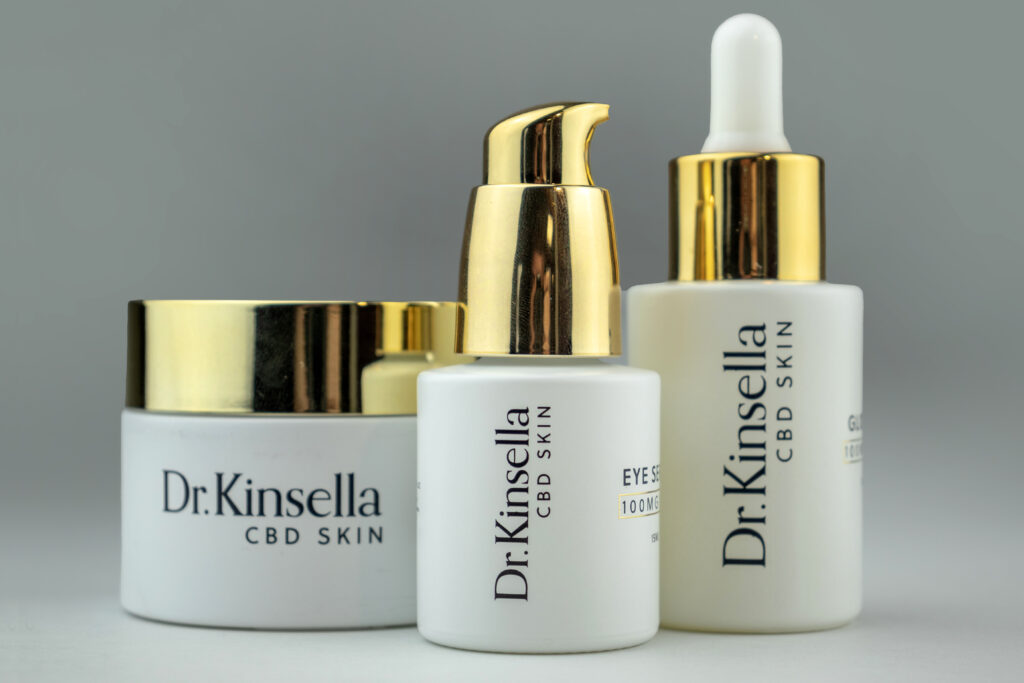GLOW OIL
FACE CREAM
EYE SERUM
Panthenol Skin Benefits and Tips

Key points
- Panthenol is a provitamin that is oxidised and turned into vitamin B5 in our bodies.
- This ingredient is one of the most popular skincare components, which can be listed under the names butanamide, D-pantothenyl alcohol, dexpanthenol, or analogue of pantothenic acid.
- Panthenol is an effective skincare ingredient which can moisturise the skin, reduce inflammation, and help wounds heal faster.
- Panthenol is well-tolerated by most people, and it can be used on all skin types.
- Dr. Kinsella Premium Eye Serum contains panthenol and a variety of other active ingredients in its formula. It effectively reduces puffiness and wrinkles, hydrates the skin, and minimises dark circles.
Do you know what the most popular skincare ingredient is? Most people think that it’s hyaluronic acid. But did you know that there is one other superhero ingredient that is just as effective at moisturising your skin as hyaluronic acid? Let us introduce panthenol, which is commonly used in skin and hair care products. In this article, we will delve into the science of panthenol as a skincare ingredient, discussing its benefits and explaining how to choose the right panthenol skincare product for you.
What Is Panthenol?
Panthenol is common provitamin that our bodies can absorb through the skin or get from food. Provitamins are chemicals that are transformed into vitamins in the body. Panthenol molecules are structurally very similar to pantothenic acid (also known as vitamin B5). Once panthenol gets into our bodies, it is quickly oxidised and turned into vitamin B5.
Vitamin B5 is very effective at retaining water, so it can hydrate the skin and keep it smooth and soft. In contrast to hyaluronic acid, which only acts as a humectant, binding water to the skin, panthenol also works as an emollient, meaning it locks moisture in the skin, sealing all cracks. Thus, it is an indispensable ingredient in a variety of skincare products that usually come in the form of transparent oil, white powder, or cream. If you go shopping specifically for skincare products that contain panthenol, keep in mind that this ingredient is sometimes listed under different names, including:
- Butanamide
- D-pantothenyl alcohol
- Dexpanthenol
- Analogue of pantothenic acid
Where Is Vitamin B5 Found?
Pantothenic acid (vitamin B5) is naturally found in a variety of foods, including:
- Dairy products
- Seafood, poultry, beef
- Avocados, mushrooms, potatoes
- Peanuts, sunflower seeds
This means that you can easily include vitamin B5 in your diet to get the full benefits of this nutrient, in addition to using skincare products formulated with panthenol.

Where Is Panthenol Used?
Skin Products
First and foremost, panthenol is used in a variety of skincare products such as lip balms, creams, lotions, serums, gel washes, foundations, and so on. It’s also used in medicinal ointments to treat insect bites, sunburns, and eczema.
Finding a high-quality skincare product among millions of options can be challenging. However, Dr. Kinsella Premium Eye Serum is an excellent and effective treatment that can help increase firmness, reduce puffiness, and minimise dark circles around the eyes, leaving the skin looking replenished, toned, and revitalised.
Hair Products
Panthenol can make your hair shiny, soft, and strong while also protecting it from heat damage, which is why it is a popular ingredient in shampoos, conditioners, and other hair care products.
Nail Products
Because your nails and hair are made of identical keratin proteins, panthenol has the same effect on both. Look for panthenol-enriched nail treatments like cuticle oil or hand cream if you want to strengthen your nails.
What Does Vitamin B5 Do For Your Skin? Panthenol Benefits
Panthenol goes far beyond simply hydrating your skin; it also has many other notable effects that you may notice after using products enriched with this ingredient.
Moisturising Effect
As mentioned above, panthenol is a humectant and an emollient, which means it reduces water loss, helping your skin to retain moisture. This ingredient also stimulates cells that improve skin barrier function. As a result, your skin can stay hydrated, healthy, and smooth. If you have dry skin, panthenol is an incredibly effective ingredient for managing dryness and skin sensitivity.
Reduced Inflammation
Vitamin B5, which is made from panthenol, plays a key role in the synthesis of coenzyme A in the body. Coenzyme A is an essential cofactor involved in nearly all central metabolic reactions. For instance, this molecule is required for the production of fatty acids, which reduce inflammation in the body.
This long chain of reactions that starts with panthenol being absorbed by our body and ends with the synthesis of anti-inflammatory fatty acids is the reason why panthenol is so effective at reducing skin irritation, itching, dryness, and roughness. For instance, many sunscreens and healing creams include panthenol to take advantage of its anti-inflammatory properties.
Faster Wound Healing
Similarly, panthenol is frequently used to help with minor skin injuries, as a strong skin barrier function is essential for quick wound healing. This ingredient reduces inflammation, minimises skin redness, and encourages regeneration, which speeds up the healing process. For instance, this is why many tattoo artists advise their clients to use panthenol creams after getting a tattoo.
Panthenol Side Effects
Panthenol is relatively safe for the vast majority of people. It also has a GRAS rating, which means that it is considered effective, and there is no evidence that the ingredient can cause harm. Panthenol also rarely causes allergic reactions. However, if you have previously experienced allergic reactions from skincare products but have never tried panthenol, it may be a good idea to consult your dermatologist before adding products with panthenol to your skincare routine.
Experts suggest using creams and serums containing no more than 5% panthenol, as these concentrations have been shown to facilitate maximum levels of absorption and hydration.
How To Use Panthenol Products
While panthenol can do wonders for your skin, it’s crucial to make sure that you use this ingredient correctly. The most fundamental rule is to use all skincare products only on freshly cleansed skin. You can use a toner to balance your skin’s pH before applying a cream, lotion, or serum containing panthenol to it. You should also follow the usage instructions provided by the product’s manufacturer and avoid applying it to your skin more frequently than recommended.
Conclusion
To summarise, panthenol is a very safe and effective hydrating and anti-inflammatory ingredient used in skin, hair, and nail care products. It works well together with a variety of other skincare ingredients products, and it is difficult to overuse. However, it’s essential to choose the right products that benefit your skin the most. Our Premium Eye Serum was developed by Dr. Martin Kinsella and underwent extensive clinical studies to ensure its maximum effectiveness and safety for your skin. This serum provides a synergetic effect of multiple powerful skincare ingredients to hydrate your under-eye area, reduce the appearance of wrinkles, and help your skin look young and plump.
FAQs
What skin type is panthenol good for?
Panthenol works well for all types of skin, but it’s especially useful for people who experience dry or flaky skin.
What does vitamin B5 do for the face?
Vitamin B5 encourages the healing of skin wounds. It is also a humectant and an emollient, which means it helps to keep the skin healthy and smooth by reducing water loss.
Is panthenol the same as retinol?
No, panthenol and retinol are two different chemicals. Panthenol is a provitamin of vitamin B5, while retinol is a form of vitamin A.
Is panthenol safe for sensitive skin?
Yes, panthenol is safe for use on sensitive skin, and it can even calm the skin by reducing redness and inflammation.
Can panthenol cause acne?
No, panthenol alone does not clog your pores or cause acne. However, some hair care products formulated with panthenol can sometimes cause acne on the shoulders or back due to other ingredients contained in them.
Is panthenol a natural ingredient?
Yes, panthenol is a natural skincare ingredient manufactured from plant or animal ingredients.
